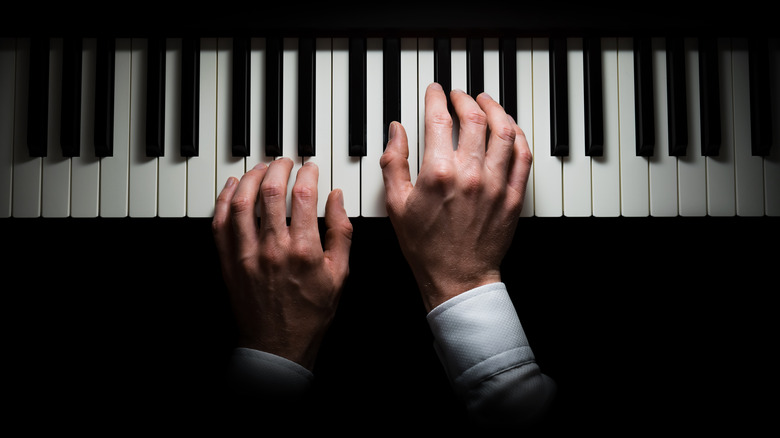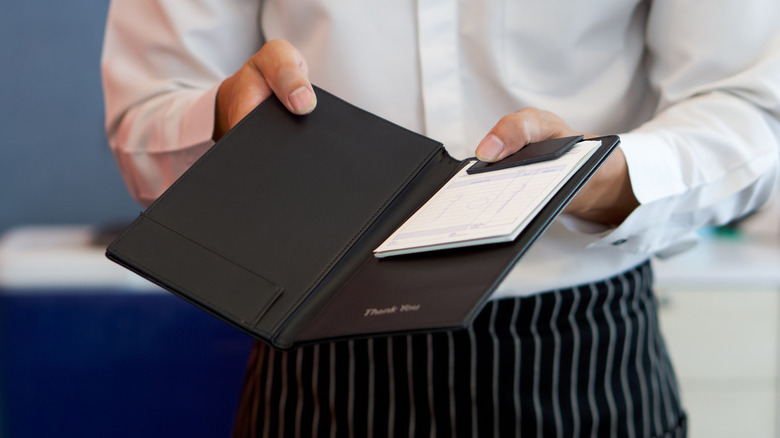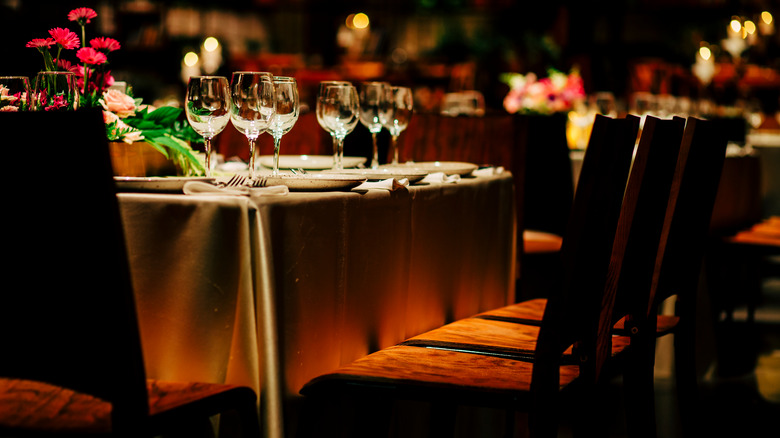The Sneaky Reason Fancy Restaurants Play Classical Music
If classical music sounds fancy to you, that's kind of the point. The symphony has always been geared toward the affluent. Before the invention of the phonograph in 1877, the only way to listen to professional musicians was to see a live performance, and tickets to a concert wouldn't be cheap (via Concert Vienna). Thus, composers who came before the age of recorded music inevitably played for wealthy aristocrats. Even though that era has long since passed, classical music has retained an elitist reputation, as evidenced by a MarketWatch report revealing that millennial-aged fans of classical music have a higher average income than their peers who favor other genres. Mozart, Beethoven, Bach, Vivaldi: Their work is the sound of money.
Picture an expensive restaurant – one with a big chandelier in the dining room. What kind of music is playing there? Classical or country? Unless the chandelier is made of antlers, it's probably classical, and there's a sneaky reason for this. Classical music evokes 'fanciness,' and while fancy is not necessarily good, we are easily duped into equating the two. Writing for The Atlantic, Alex Mayyasi explains that presentation and marketing lead us to associate stereotypically fancy things such as classical music and wine with higher quality. This idea settles into our subconscious, making us biased towards traditionally elitist products and experiences. It turns out that hearing classical music can even make us behave in a more affluent fashion, a fact that restaurateurs have been taking advantage of.
Classical music makes diners spend more
A study published in Environment and Behavior revealed that playing classical music in a restaurant led customers to spend more money on their meals. Researchers from the University of Leicester played classical music, pop music, and no music at an upscale British restaurant over the course of 18 nights. They found that diners who'd heard classical music spent significantly more on average than those who listened to pop music or silence. In particular, hearing classical music led people to spend more on appetizers and coffee.
The research team offers three explanations for their findings. First, they suggest that classical music was a better fit for the restaurant's atmosphere, but they note that the same trend was found at a school cafeteria, suggesting that your surroundings have limited influence in the matter. Secondly, they suggest that classical music appealed more to the restaurant's customer base — it was in an affluent neighborhood. But the theory the researchers favor is that classical music makes us perceive a restaurant as more upmarket and worth spending more on.
Another factor here may be that playing slow music (which classical tends to be when compared to pop) has been shown to make diners spend more time and money at restaurants (via The Association for Consumer Research). More time spent may also equate to more items ordered, particularly optional courses such as appetizers and post-meal coffee, the two areas where the University of Leicester team saw the highest spending.
Restaurant music affects more than your spending
It turns out that music has multiple effects on the dining experience, reaching far beyond the money we spend. Earth.com cites a University of Florida study that showed that the volume of music played in a restaurant affects whether diners order healthy or unhealthy foods. When diners were exposed to loud music, they favored items such as burgers and french fries, while diners who heard soft music favored lighter options like salads. This time, the researchers are fairly sure they know what's behind this behavior. Hearing loud music raises your heart rate, leading you to crave more energy-dense, high-calorie foods.
Most incredibly, music can actually change our perception of taste. The Guardian cites a study from Oxford University in which participants drank coffee while listening to high-frequency and low-frequency sounds. They found that high notes made the coffee taste sweeter while low notes brought out the bitterness. Another study found that loud sounds suppress our perceptions of saltiness and sweetness. It's suggested that background noise, along with the effects of air pressure on our sinuses, is one of the reasons that airplane food tends to taste bland. It's not just volume though, as The Guardian also cites a study that showed people associate certain aromas with specific instruments. Floral and citrus scents were matched with piano music, while musky smells were linked to brass. So, the next time you eat out, listen closely. What do you hear, and what do you crave?


